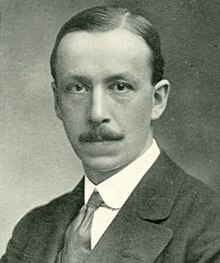Robert Heath Lock

Robert Heath Lock (19 January 1879 – 26 June 1915) was an English botanist and geneticist who wrote the first English textbook on genetics.[1]
Life[]
Robert Heath Lock was the son of , an Eton schoolmaster and writer of mathematical textbooks. Born at Eton College on 19 January 1879, he was educated at Charterhouse and Caius College, Cambridge, where he graduated in the Natural Sciences Tripos in 1902. Appointed Scientific Assistant to the Director of the Royal Botanic Gardens at Peradeniya in 1902, he returned to Cambridge in 1905 to be Curator of the . In 1908 he became Assistant Director of the Royal Botanic Gardens, Peradeniya, serving as Acting Director in 1909 and 1912. He specialized in the breeding of Hevea brasiliensis for rubber production.[2] In 1910 Lock married Bella Sidney Woolf, the sister of Leonard Woolf. He died in Eastbourne on 26 June 1915 and is buried with his sister and brother-in-law in the Ascension Parish Burial Ground, Cambridge.
Lock was an advocate of Mendelian inheritance and mutationism.[3][4]
Textbook on genetics[]
Lock was the author of Recent Progress in the Study of Variation, Heredity, and Evolution, 1906. It went through five editions. It has been described as the first English textbook on genetics and was widely admired in America and the United Kingdom until Lock's death in 1915.[1] The book inspired Hermann Joseph Muller and others to study genetics but was essentially forgotten after World War I.[1]
In 1907, it was positively reviewed in Nature and The American Naturalist journals.[3][5] In 1908, Alfred Russel Wallace wrote supportively about the textbook:
In conclusion, I would suggest to those of my readers who are interested in the great questions associated with the name of Darwin, but who have not had the means of studying the facts either in the field or the library, that in order to obtain some real comprehension of the issue involved in the controversy now going on they should read at least one book on each side. The first I would recommend is a volume by Mr. R. H. Lock on “Variation, Heredity and Evolution” (1906) as the only recent book giving an account of the whole subject from the point of view of the Mendelians and Mutationists.[6]
Works[]
- Studies in Plant Breeding in the Tropics, 1904
- Recent Progress in the Study of Variation, Heredity, and Evolution, 1906
- Rubber and Rubber Planting, 1913
References[]
- ^ Jump up to: a b c Edwards, A. W. F. (2013). "Robert Heath Lock and His Textbook of Genetics, 1906". Genetics. 194 (3): 529–537. doi:10.1534/genetics.113.151266. ISSN 0016-6731. PMC 3697961. PMID 23824968.
- ^ LOCK, Robert Heath, Who Was Who, online edn, Oxford University Press, 2014, accessed 11 April 2015
- ^ Jump up to: a b J. A. H. (1907). Reviewed Work: Recent Progress in the Study of Variation. Heredity and Evolution by R. H. Lock. The American Naturalist 41 (489): 603-604.
- ^ Stoltzfus, Arlin. (2014). Mendelian-Mutationism: The Forgotten Evolutionary Synthesis. Journal of the History of Biology 47: 501-546.
- ^ F. A. D. (1907). Recent Progress in the Study of Variation, Heredity and Evolution. Nature 75: 578-579.
- ^ Wallace, Alfred Russel. (1908). The present position of Darwinism. Contemp. Rev. (Aug): 140.
External links[]
- 1879 births
- 1915 deaths
- English botanists
- English geneticists
- Mutationism
- People educated at Charterhouse School